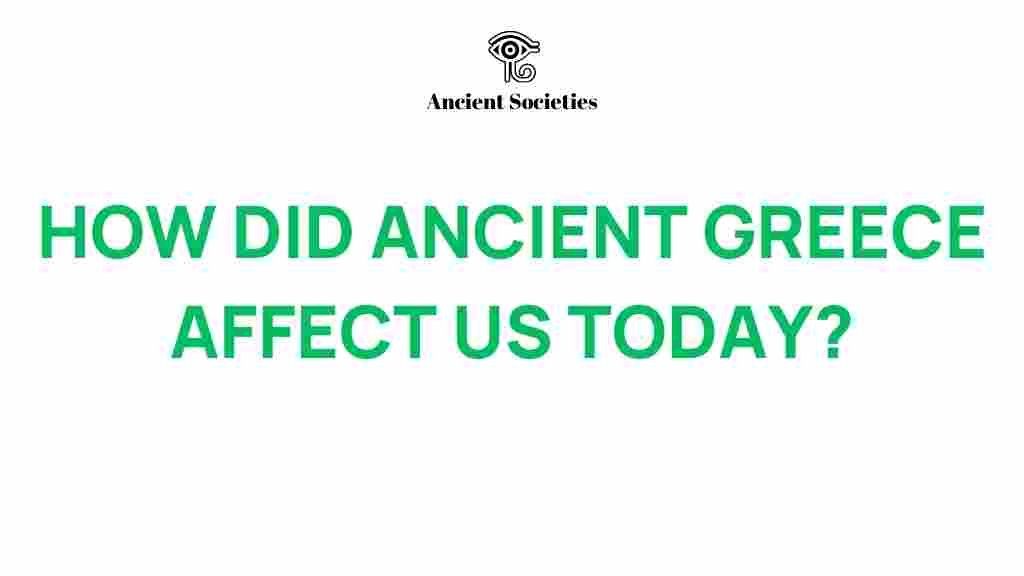The Enduring Legacy of Ancient Greece
Ancient Greece is often hailed as the cradle of Western civilization, with its profound legacy shaping various aspects of our modern world. From democracy to philosophy, and from art to architecture, the influences of Ancient Greece can be seen everywhere. This article will delve into the numerous ways in which Ancient Greece has left an indelible mark on contemporary society, highlighting its significant contributions to democracy, culture, education, science, and more.
1. The Birth of Democracy
One of the most notable legacies of Ancient Greece is the concept of democracy. Originating in Athens in the 5th century BC, democracy in Ancient Greece laid the foundation for the political systems we see today.
- Direct Participation: Citizens were actively involved in decision-making.
- Political Equality: The idea that every citizen had a voice.
- Rule of Law: Laws applied equally to all citizens.
The principles of Ancient Greek democracy continue to influence modern democratic systems worldwide. The impact can be seen in various forms of government and the importance placed on civic engagement and electoral participation.
2. Philosophical Foundations
Ancient Greece is the birthplace of Western philosophy. Thinkers like Socrates, Plato, and Aristotle explored fundamental questions about existence, ethics, and knowledge. Their ideas continue to resonate in contemporary philosophy and critical thinking.
- Socratic Method: A form of cooperative argumentative dialogue that stimulates critical thinking.
- Plato’s Theory of Forms: The belief that non-material abstract forms represent the most accurate reality.
- Aristotle’s Empiricism: Emphasizing observation and experience as the basis for knowledge.
These philosophical principles have shaped modern scientific methodologies and ethical frameworks, influencing not just philosophy but also psychology, political theory, and education.
3. Cultural Contributions
The cultural legacy of Ancient Greece is vast and varied, encompassing literature, theater, and mythology. The works of Homer, like the “Iliad” and the “Odyssey,” are not only literary masterpieces but also provide insights into the values and beliefs of the time.
- Theatre: Birth of tragedy and comedy, influencing modern drama.
- Mythology: Rich stories that explain natural phenomena and human behavior.
- Literature: Poetic forms and narrative techniques that continue to inspire writers.
These cultural elements have enriched our global heritage, offering timeless themes and narratives that continue to be explored in various art forms today.
4. Architectural Marvels
Ancient Greek architecture has left a lasting impression on the world. Structures such as the Parthenon and the Temple of Apollo are prime examples of Greek architectural excellence. Their influence can be seen in modern buildings and civic structures across the globe.
- Columns: The use of Doric, Ionic, and Corinthian columns set the standard for classical architecture.
- Proportions: The emphasis on symmetry and proportion in design.
- Public Spaces: Development of agoras and theaters as centers for community engagement.
These architectural principles continue to inform modern urban planning and the design of public spaces, emphasizing functionality and aesthetic appeal.
5. Artistic Innovations
The legacy of Ancient Greece in the arts is profound. The Greeks excelled in sculpture, pottery, and painting, establishing techniques that artists would emulate for centuries. Their attention to human anatomy and emotion in art set standards for realism and expression.
- Statues: Life-like figures that conveyed beauty and realism.
- Pottery: Elaborate designs that tell stories and depict daily life.
- Frescoes: Wall paintings that captured historical and mythological scenes.
Modern art continues to draw inspiration from Greek techniques and themes, showcasing the enduring power of their artistic legacy.
6. Advancements in Education
Education in Ancient Greece emphasized critical thought, debate, and the pursuit of knowledge. The establishment of institutions, such as Plato’s Academy and Aristotle’s Lyceum, laid the groundwork for modern educational systems.
- Curriculum Development: Focus on a broad range of subjects including philosophy, science, and arts.
- Rhetoric and Debate: Skills that are essential in modern education and public speaking.
- Mentorship: The importance of teacher-student relationships in learning.
The emphasis on a well-rounded education continues to influence contemporary teaching methods and educational philosophies.
7. Scientific Discoveries
Ancient Greece also contributed significantly to the fields of science and mathematics. Pioneers like Euclid and Archimedes laid the foundations for geometry and physics. Their discoveries and methodologies have shaped modern scientific inquiry.
- Geometry: Euclidean geometry remains fundamental in mathematics.
- Physics: Archimedes’ principles are still taught in science classes today.
- Medicine: Hippocrates, often called the “Father of Medicine,” established ethical standards still relevant today.
The scientific approaches developed during this period have paved the way for advancements in technology and medicine, underscoring the importance of empirical research and rational thought.
8. Troubleshooting Modern Understanding of Ancient Greece
Despite the clear influence of Ancient Greece, many people may struggle to connect its historical context with contemporary life. Here are some tips to enhance your understanding:
- Read Classical Texts: Engaging with original works can provide deeper insights.
- Visit Museums: Explore artifacts and artworks to experience Greek culture firsthand.
- Participate in Discussions: Joining study groups or online forums can help clarify concepts.
By actively engaging with the material, one can appreciate the complexity and relevance of Ancient Greek contributions to our world today.
Conclusion
The enduring legacy of Ancient Greece is evident in many facets of our modern lives. From the principles of democracy to the foundations of philosophy, education, and science, Ancient Greece has profoundly influenced our world. As we navigate contemporary challenges, understanding this legacy can provide valuable insights into our values, governance, and cultural expressions.
In embracing the lessons of Ancient Greece, we continue to build upon the rich tapestry of human civilization, ensuring that its remarkable contributions are not only remembered but also celebrated. For further exploration of Ancient Greece and its impact, consider visiting resources like Ancient History Encyclopedia.
This article is in the category History and created by AncientSocieties Team
